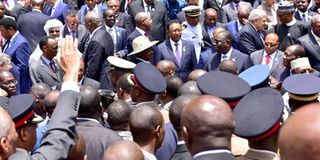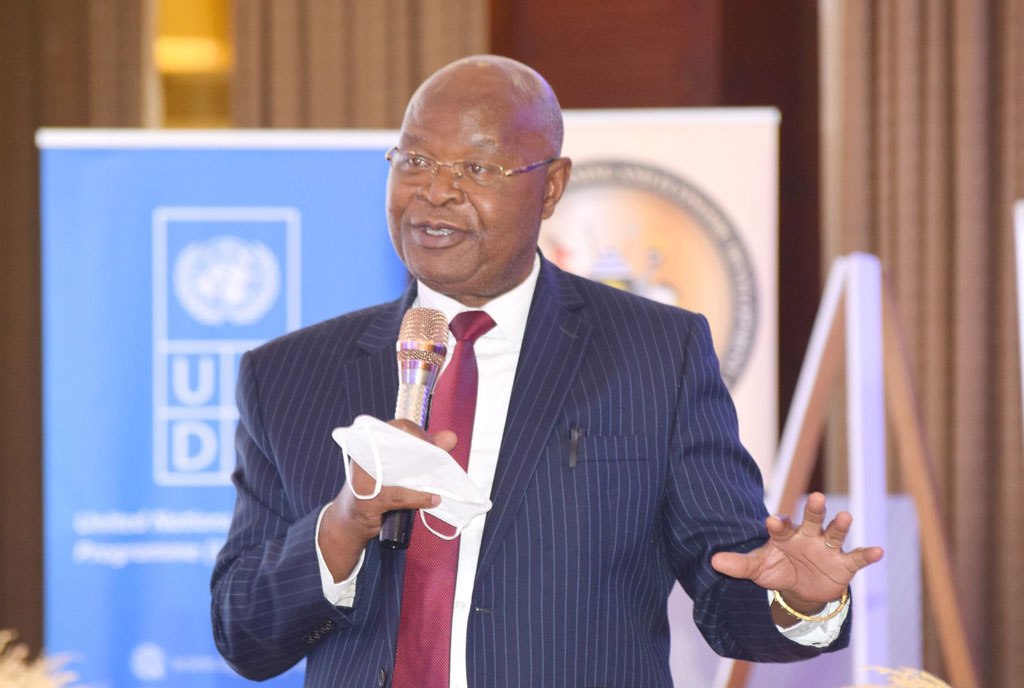African leaders agree to use Museveni’s paper on Africa’s problems as development guide

Mr Yoweri Museveni ( with his trademark hat) amidst other African Presidents.
What you need to know:
- Africa’s first bottleneck is ideological disorientation, which had fanned tribal and sectarian conflicts
- The second bottleneck, observed by Mr Museveni, is a weak state exemplified in a weak army, adding that it is a result of the first obstacle
- The President commended the international community for speaking about the third bottleneck; human resource underdevelopment. He, however, said the issue had been raised in isolation of the other bottlenecks
- Underdevelopment of infrastructure is the fourth bottleneck, said Mr Museveni. He said many development partners were disinterested in building Africa’s infrastructure especially electricity
KAMPALA:
African leaders meeting in the Kenyan capital Nairobi, on Friday agreed to use President Museveni’s paper on “bottlenecks facing Africa’s development” as a blue print to drive the conversation on the continent’s problems.
The decision was reached at by the leaders meeting for the African Peer Review Mechanism (APRM) chaired by President Uhuru Kenyatta at the Intercontinental Hotel, on the sidelines of the sixth Tokyo International Conference on African Development (TICAD).
President Museveni told the meeting that he had arrived at the 10 bottlenecks after watching the development scene in Africa for 50 years. “I have picked some ideas which are responsible for our lagging behind. The problem seems not to be addressing all issues in a comprehensive way.”
The motion to adopt the paper and task the APRM secretariat to expand it into a blue-print for the continent was moved by South African President Jacob Zuma and was unanimously supported. The proposal had earlier been backed by Senegalese President Macky Sall of Senegal and Ellen Johnson Sirleaf of Liberia in their earlier presentations.
According to President Museveni, Africa’s first bottleneck is ideological disorientation, which had fanned tribal and sectarian conflicts.
“A lot of chaos in Africa is because of misidentification. We need to ask, is identity more important than interests? Ask, who buys what you produce, is it your tribes mate or religious mate?”
The second bottleneck, observed by Mr Museveni, is a weak state exemplified in a weak army, adding that it is a result of the first obstacle.
“When you want to build an army and you look for people from your tribe, you should ask, can a sectarian army command respect of a whole country? In such circumstances, when you get a small rebellion the army collapses. You then bring in the UN who are armed tourists.”
The President commended the international community for speaking about the third bottleneck; human resource underdevelopment. He, however, said the issue had been raised in isolation of the other bottlenecks.
Underdevelopment of infrastructure is the fourth bottleneck, said Mr Museveni. He said many development partners were disinterested in building Africa’s infrastructure especially electricity.
“They do not care about dams, roads and the railway. As a consequence, only South Africa and Libya under Gaddafi had high electricity consumption. Importantly, poor infrastructure causes very high costs of doing business. You can’t attract investments, how then do you eradicate poverty if people are not employed?” he asked.
Because of poor infrastructure, the next bottleneck is failure to industrialize, the President said. This, he added, had forced Africa into exporting raw materials and ultimately donating a lot of revenue to the West. Citing the Ugandan example where a kilogram of unprocessed exported coffee goes for $1 while the processed coffee in the West fetches $14, President Museveni asserted that Africans were the real donors—and unfortunately were donating their jobs too.
“Colonialism cut Africa into small countries with small populations that are not developed enough to support production. Without a united market you can’t attract investments.”
He commended African leaders for trying to bridge this gap by creating regional blocs and integration hence a bigger market.
The last obstacle, President Museveni noted, was democracy but added that most of Africa had addressed this and it was prevailing across the continent.
The APRM was held ahead of TICAD summit which ended on Sunday.



